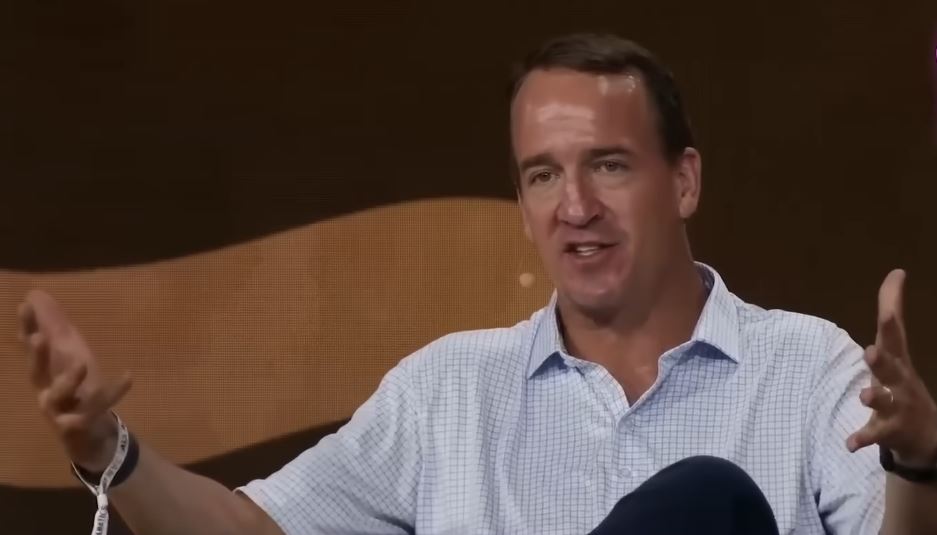A heartwarming tale about Peyton Manning adopting a young girl named Lily started trending on social media in recent months. An orphan, pancakes, Sunday visits, and a slow, heartwarming adoption arc that ended with a tearful speech at a charity gala were all depicted in the post’s vivid picture. The story was fiction, crafted, shared, and believed by thousands, if not millions, despite its exquisite composition.
Analyzing the story’s structure and related images made it abundantly evident that the story was designed to go viral. Later, experts verified that the post’s accompanying photos were artificial intelligence (AI)-generated, combining lighting, staging, and facial expressions to create a strikingly realistic but slightly off-kilter look. Simply put, it was an emotional illusion.
Peyton Manning – Personal and Professional Profile
| Full Name | Peyton Williams Manning |
|---|---|
| Birthdate | March 24, 1976 |
| Birthplace | New Orleans, Louisiana |
| Age | 49 (as of 2025) |
| Spouse | Ashley Thompson Manning |
| Children | Marshall & Mosley Manning |
| Occupation | Retired NFL Quarterback, TV Host, Philanthropist |
| Known For | 5× NFL MVP, 2× Super Bowl Winner, Hall of Fame |
| Foundation | PeyBack Foundation |
| Reference | https://en.wikipedia.org/wiki/Peyton_Manning |
Long respected for his moral character and composure, Peyton Manning has never publicly adopted a child. He is raising the fraternal twins, Marshall and Mosley, out of the public eye with his wife Ashley. Their remarkably grounded and closely guarded family life demonstrates a shared dedication to authenticity. The dissemination of this fictional story seemed especially invasive for a man whose name has been linked to excellence on and off the field.
The internet has become more adept at converting feel-good fiction into viral belief over the last ten years. Particularly when a story fits with a celebrity’s perceived personality, emotional resonance frequently triumphs over factual accuracy. Manning was a prime candidate for such a story because he was already active in youth-focused philanthropy through the PeyBack Foundation. His reputation for mentoring and kindness made the fictional story seem remarkably realistic.
The story’s emotional choreography was what made it so compelling. It met all the requirements, from tragic beginnings to the intervention of a kind hero, followed by personal growth and public approval. The narrative was remarkably successful in avoiding logical skepticism. By doing this, it demonstrated how the digital information landscape is changing due to emotionally charged content, particularly when it involves artificial intelligence.
Peyton Manning continues to support causes that align with his values—education, youth empowerment, and access to healthcare—through strategic alliances and public appearances. His real-world deeds, which are especially helpful to marginalized communities, are frequently more subdued but have a far greater influence than any social media fantasy. Instead of adopting a made-up Lily, he has helped thousands of actual children in America by offering financial aid, mentoring programs, and scholarships.
An increasing cultural conundrum is brought to light by the popularity of AI-generated narratives like this one. Internet users resorted more and more to comforting sentimental content during the pandemic. These days, deeply emotional, highly shareable fiction is being created using AI tools, frequently obfuscating the distinction between narrative and truth. This change entails being drawn into made-up narratives that they neither support nor direct for famous people like Manning.
This story merits further examination in the context of digital ethics, not because of its emotional appeal but rather because of its implications for media literacy and belief. Manning’s made-up adoption served as a conduit for popular desire. Because it provided compassion, closure, and a clear-cut moral conclusion, people wanted to believe it. However, truth must be kept sacred, particularly when it comes to public storytelling.
The cleverness with which today’s disinformation is presented, rather than the lies themselves, is what makes it so novel. The Manning-Lily story pretended to be an eyewitness account by using subtle adverbial phrases, a descriptive tone, and even quote-style formatting. Many readers never questioned its legitimacy because it was unconfirmed. Misinformation no longer shouts; instead, it whispers—persuasively, emotionally, and frequently in a beautiful way.
These stories are even more powerful for younger social media users or older audiences who are less able to recognize digital fabrication. They seem authentic. They seem real. They also provide exactly what people are looking for on an emotional level. However, disseminating unverified fiction, even for a worthy cause, damages confidence in the integrity of real people carrying out real work as well as in the media.
Manning has not responded to the report. His silence says a lot, either because he doesn’t want to spread false information or because he respects the story’s emotional impact. In any case, there is no more obvious difference between his real family and the AI fantasy. On their terms, his kids—Mosley in particular—are flourishing. Notably, Marshall is pursuing his father’s love of sports. Neither has appeared in any fictional or real-life adoption story.
Even in the face of false information, Peyton Manning‘s genuine personality endures remarkably. A man who revolutionized leadership on the field is now making an impact off it through constant generosity rather than showy gestures. With little fanfare, his PeyBack Foundation still provides support and mentoring to actual families.
